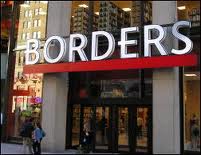 File this one under the not-so-shocking news category. In a filing with the SEC this week, Borders Group warned investors that buying its stock "is highly speculative and poses substantial risks." If last week's $215-million bid by Direct Brands--owned by private equity firm Najafi Companies--to buy most of the company is approved by a bankruptcy court later this month, Borders "would become a subsidiary of Direct Brands and its stock would no longer be traded if the company goes private," the Detroit News reported.
File this one under the not-so-shocking news category. In a filing with the SEC this week, Borders Group warned investors that buying its stock "is highly speculative and poses substantial risks." If last week's $215-million bid by Direct Brands--owned by private equity firm Najafi Companies--to buy most of the company is approved by a bankruptcy court later this month, Borders "would become a subsidiary of Direct Brands and its stock would no longer be traded if the company goes private," the Detroit News reported.
Borders said in its filing "the company expects that its currently outstanding common stock will have no value." The New York Stock Exchange stopped trading Borders after the bookseller filed for bankruptcy protection in February, with a final sale price of 23 cents per share. The stock has been trading over the counter, where it plunged from 24 cents a share to 9 cents Tuesday, the Detroit News wrote.
International Business Times noted that yesterday, Borders stock finished at 7 cents per share, after opening at 9 cents, but Borders warned in the SEC filing that trading prices "may bear little or no relationship to the actual recovery, if any, by holders in our Chapter 11 bankruptcy proceedings. Accordingly, the company urges extreme caution with respect to existing and future investments in its common stock."
---
 The Booksellers Association in the U.K. will formally oppose Amazon.com's plan to acquire the Book Depository International (Shelf Awareness, July 5, 2011), the Bookseller reported, adding that the Office of Fair Trading is investigating the deal and the Publishers Association "already has a lawyer working on its submission to the OFT."
The Booksellers Association in the U.K. will formally oppose Amazon.com's plan to acquire the Book Depository International (Shelf Awareness, July 5, 2011), the Bookseller reported, adding that the Office of Fair Trading is investigating the deal and the Publishers Association "already has a lawyer working on its submission to the OFT."
BA CEO Tim Godfray said booksellers are contending with increased pressure and competition from internet retailing and the acquisition would put a "dominant player into an even stronger position.... Amazon's current position could be perceived by booksellers already as that of a de facto monopoly that doesn’t take into account this new proposed development and its recent positioning as an e-book publisher. It is good news that this matter is being referred to the OFT. We in the book trade need to be ever-mindful of the fact that high street retailers cannot survive as showrooms for internet retailers indefinitely. We urge anyone with an interest in this matter to make their views known to the OFT."
---
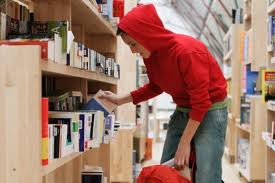 As we proceed through the age of the e-book, will shoplifting traditional books become a dying art? In the Daily Beast, Rachel Shteir anticipated the "End of Shoplifting Books" and suggested "book shoplifting differs from other variations of the five-finger discount in that it seems to arise, at least in some instances, not merely out of a desire to resell the stolen item, but from an aspirational craving to read--to be literary--or some other high-minded hunger, such as the one for knowledge."
As we proceed through the age of the e-book, will shoplifting traditional books become a dying art? In the Daily Beast, Rachel Shteir anticipated the "End of Shoplifting Books" and suggested "book shoplifting differs from other variations of the five-finger discount in that it seems to arise, at least in some instances, not merely out of a desire to resell the stolen item, but from an aspirational craving to read--to be literary--or some other high-minded hunger, such as the one for knowledge."
Shteir also noted that one way to consider book shoplifting's rise and potential decline "is to think about how it is linked to the paperback. The most evocative accounts of the crime were written in the 1930s, 1940s and 1950s, after publishers invented mass market paperbacks, which were lightweight, cheap, and easily stolen."
---
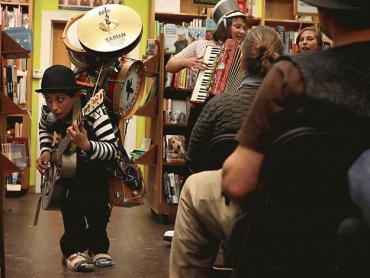 "Someone let the clowns into the bookstore," the San Francisco Chronicle noted in its look at indie bookstores and their increasing role as community centers. The Chronicle visited the Booksmith for "a monthly event called Literary Clown Foolery.... Based on what could only be called a loose interpretation of Armistead Maupin's Mary Ann in Autumn, the show drew a crowd of about 50 into a neighborhood bookshop whose owners now do a lot more than sell books."
"Someone let the clowns into the bookstore," the San Francisco Chronicle noted in its look at indie bookstores and their increasing role as community centers. The Chronicle visited the Booksmith for "a monthly event called Literary Clown Foolery.... Based on what could only be called a loose interpretation of Armistead Maupin's Mary Ann in Autumn, the show drew a crowd of about 50 into a neighborhood bookshop whose owners now do a lot more than sell books."
"We saw the Booksmith as the perfect place for a lab experiment," said Christin Evans, co-owner of the bookshop with Praveen Madan. "Our goal was to create an inviting, welcoming space. Our business plan was to do anything that Amazon and Google won't."
Elaine Petrocelli, founder of Book Passage, observed: "Our business model is, I love to go out on floor and sell books because that's where I learn what works." Book Passage sponsors literary luncheons, three writers conferences, more than 750 author events and 300 classes a year at its locations in Corte Madera and San Francisco.
---
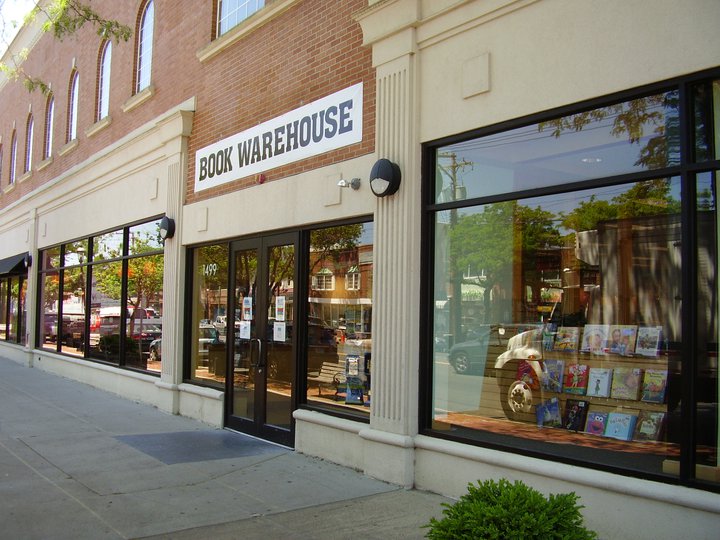 Fairfield University, Fairfield, Conn., is opening a bookstore in the 23,000-sq.-ft. location on the Post Road that was occupied by a Borders store that closed in May, the Daily Fairfield reported.
Fairfield University, Fairfield, Conn., is opening a bookstore in the 23,000-sq.-ft. location on the Post Road that was occupied by a Borders store that closed in May, the Daily Fairfield reported.
The store will open in October and stock textbooks for university students as well as bestsellers and general interest books. The store will also sell university merchandise and athletic apparel for several local high schools. The university aims to have a national chain operate a café in the location and may sell computers.
University president Jeffery von Arx commented: "It is our hope that the store will serve as a meeting place and a destination for residents and guests. We are planning to use the store to house some of our programming--lectures from scholars and author readings and other small cultural events--and it is our anticipation that by opening a Fairfield University Bookstore downtown, we will bring the intellectual and cultural life of our university more fully into the heart of the community."
A Book Warehouse outlet and Taj Café are operating temporarily in the location. Fairfield University has signed a 10-year lease for the site.
---
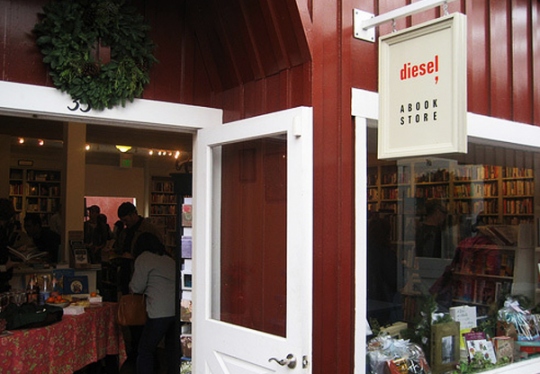 DIESEL, A Bookstore, is getting a lot of love lately. In addition to Charles McLeod's comments in the San Francisco Chronicle (Shelf Awareness, July 6, 2011), another former bookseller, Geo Ong, wrote a thank-you letter to the bookshop on the Urchin Movement blog, observing: "[Bookstores] have the ability to become an entire person, or even an entire group of people--with thoughts, concerns, and opinions that shape both who we think we are and who we can be--and they can reflect what is going on in our world and society at almost any given moment, even the future....
DIESEL, A Bookstore, is getting a lot of love lately. In addition to Charles McLeod's comments in the San Francisco Chronicle (Shelf Awareness, July 6, 2011), another former bookseller, Geo Ong, wrote a thank-you letter to the bookshop on the Urchin Movement blog, observing: "[Bookstores] have the ability to become an entire person, or even an entire group of people--with thoughts, concerns, and opinions that shape both who we think we are and who we can be--and they can reflect what is going on in our world and society at almost any given moment, even the future....
"For two years I've been a part of a bookstore that steadfastly maintains its identity and embraces its role as a hub of culture, an intellectual thoroughfare, as all good bookstores have the ability to be and should strive to be. DIESEL, there isn't another bookstore exactly like you, but there are bookstores with the same steadfastness, the same integrity, with perhaps a similar spirit. And for that, I thank you."
---
Cool idea of the day: Vroman's, Pasadena, Calif., is posting customers' "Vroman's Stories." Participants can win a gift basket of Pasadena merchandise worth $400. Staff stories include one bookseller recalling the first time she met her future husband, a fellow bookseller, at the store.
---
 Lisa Napoli, formerly a reporter for NPR's Marketplace, recently spent five months traveling the country promoting her new book, Radio Shangri-La, an account of setting up a radio station in Bhutan. She visited and plugged her book at a range of bookstores, including Chaucer's, Quail Ridge Books & Music, Books & Books and Left Bank Books as well as libraries, book clubs, book festivals, luncheons, museums, radio stations and more.
Lisa Napoli, formerly a reporter for NPR's Marketplace, recently spent five months traveling the country promoting her new book, Radio Shangri-La, an account of setting up a radio station in Bhutan. She visited and plugged her book at a range of bookstores, including Chaucer's, Quail Ridge Books & Music, Books & Books and Left Bank Books as well as libraries, book clubs, book festivals, luncheons, museums, radio stations and more.
In a post on her blog called Adventures in Bookselling, Napoli recounts her travels and the lessons learned. Her takeaway: "In this year, 2011, writing a book isn't just about writing a book. It's about selling your book--and there's no one way to do it, and no one like you to do it. (Although it is hardly a solo pursuit: you need to enlist a small army of supporters every step of the way.) I've loved every single crazy often exhausting minute of the last five months, the people I've met, the old friends and colleagues who've showed up along the way, visiting bookstores and libraries and luncheons in beautiful communities filled with people who love books, love reading, love learning."
---
"In one sentence, what do you actually do all day in your job?" New York magazine asked author Ann Brashares in a lightning-fast Q&A. Her response: "Avoid writing/pretend to write/actually write."
---
Salon explored the imaginary stacks of the Invisible Library, which stores "those books that exist only within works of fiction."
---
Jane Austen and William Shakespeare were notably absent from the Huffington Post's "Americans pick their favorite British authors."
---
Flavorwire showcased the "best illustrations from 130 years of the Brothers Grimm."
---
NPR featured its picks for the "summer's biggest, juiciest nonfiction adventures."
---
Inkheart trilogy author Cornelia Funke chose her top 10 fairytales for the Guardian, while cautioning that she was "not sure I should call the 10 I have picked my favourites. Some of them made a huge impression on me as a child with their haunting sadness and images that speak to us in far more than just words. Others I only just discovered when I did my research for Reckless. Are the tales about Arthur fairytales? And how about the Mabinogion, my favourite collection of folklore? I didn't put either of them on my list, as they each encompass too vast a universe. I chose instead short and more isolated tales. Though, of course, once you have a closer look, they are all related, as they all speak about human nature."
---
Ernesto Martinez has joined Bookmasters as manager of Spanish-language products and programs. For the past five years, he has been Borders's Spanish-language book buyer.
Martinez began his career working for a design firm in Mexico, then was production and sales manager for a Mexican publishing company and eventually worked for a Spanish book distributor in Chicago before joining Borders.
Larry Bennett, president of Bookmasters' international division, said Martinez "brings to Bookmasters a wealth of knowledge about Spanish language titles, publishers, and authors as well as great contacts among Spanish-language publishers in the U.S. and overseas. He will lead a team that provides comprehensive distribution, print-on-demand, and e-book services to overseas publishers seeking distribution in the U.S. and abroad."
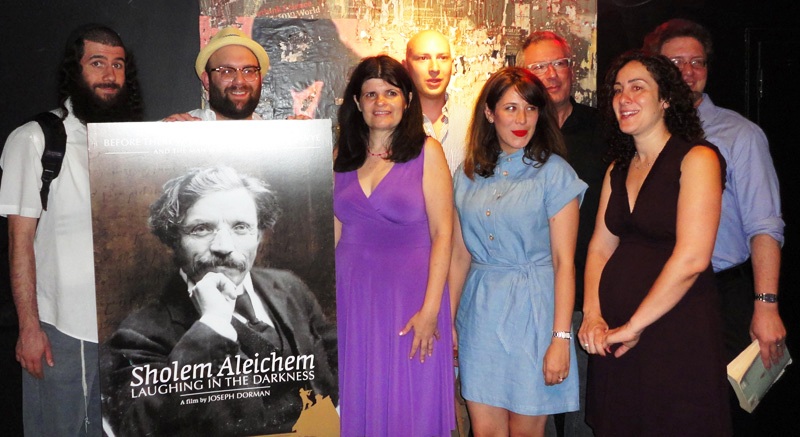










 File this one under the not-so-shocking news category. In a
File this one under the not-so-shocking news category. In a  The Booksellers Association in the U.K. will formally oppose Amazon.com's plan to acquire the Book Depository International (
The Booksellers Association in the U.K. will formally oppose Amazon.com's plan to acquire the Book Depository International ( As we proceed through the age of the e-book, will shoplifting traditional books become a dying art? In the
As we proceed through the age of the e-book, will shoplifting traditional books become a dying art? In the  "Someone let the clowns into the bookstore," the
"Someone let the clowns into the bookstore," the  Fairfield University, Fairfield, Conn., is opening a bookstore in the 23,000-sq.-ft. location on the Post Road that was occupied by a Borders store that closed in May, the
Fairfield University, Fairfield, Conn., is opening a bookstore in the 23,000-sq.-ft. location on the Post Road that was occupied by a Borders store that closed in May, the 
 Lisa Napoli, formerly a reporter for NPR's Marketplace, recently spent five months traveling the country promoting her new book, Radio Shangri-La, an account of setting up a radio station in Bhutan. She visited and plugged her book at a range of bookstores, including Chaucer's, Quail Ridge Books & Music, Books & Books and Left Bank Books as well as libraries, book clubs, book festivals, luncheons, museums, radio stations and more.
Lisa Napoli, formerly a reporter for NPR's Marketplace, recently spent five months traveling the country promoting her new book, Radio Shangri-La, an account of setting up a radio station in Bhutan. She visited and plugged her book at a range of bookstores, including Chaucer's, Quail Ridge Books & Music, Books & Books and Left Bank Books as well as libraries, book clubs, book festivals, luncheons, museums, radio stations and more.

 This Saturday Hogwarts is coming to
This Saturday Hogwarts is coming to  Last July, EW toured the "
Last July, EW toured the "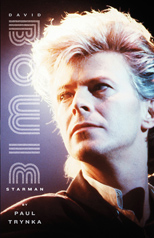 It seems fitting that the "real" David Bowie, long a master of chameleon-like ch-ch-changes, has remained an enigma despite a slew of biographies. While Paul Trynka's new book--unauthorized by Bowie and containing no new interviews with him--does not solve the mystery or provide anecdotes of the "never before revealed" variety, it does offer a very thoughtful and meticulously researched study of one of rock's few supernovas, as well as the era that produced him.
It seems fitting that the "real" David Bowie, long a master of chameleon-like ch-ch-changes, has remained an enigma despite a slew of biographies. While Paul Trynka's new book--unauthorized by Bowie and containing no new interviews with him--does not solve the mystery or provide anecdotes of the "never before revealed" variety, it does offer a very thoughtful and meticulously researched study of one of rock's few supernovas, as well as the era that produced him.